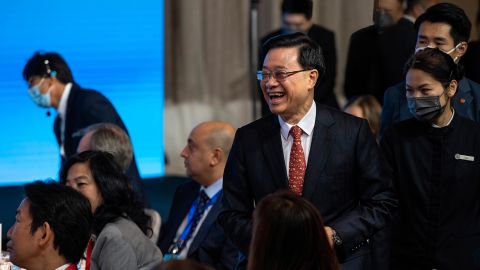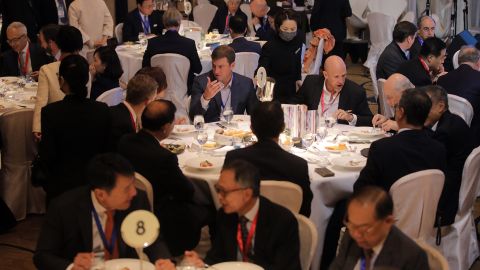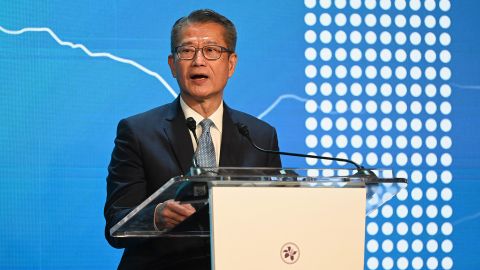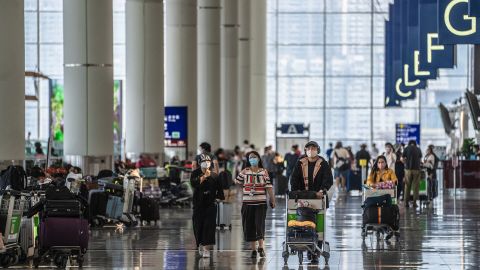Hongkong
CNN
—
At a grand financial summit in Hong Kong this week, the city’s leaders triumphantly told a room packed with Wall Street executives that the Asia Center had reopened. “The worst is over,” he declared.
Two days later, tens of thousands of rugby fans flocked to the city’s largest stadium for the Hong Kong Sevens, the biggest (and often busiest) sporting event of the year, which has been held since 2019 due to political turmoil. Suspended from the beginning, and later suspended due to the new crown pneumonia epidemic. 19.
The two high-profile international events sent a clear message: Hong Kong is finally reopening after nearly three years of border closures, enforced quarantines and restrictions on business and social gatherings.
For most of the pandemic, the semi-autonomous Chinese city has maintained some of the strictest restrictions in the region, including one of the longest mandatory quarantines for international arrivals in the world. With the economy slumping and fears growing that Hong Kong is being left behind as the world develops, the government finally opened the city’s doors in September, ending its formal quarantine to the relief of millions.
“We were, are, and we will continue to be one of the world’s leading financial centers,” Hong Kong leader John Lee vowed at Wednesday’s summit, which was attended by more than 200 investors from 20 countries. “You can give it to the bank.”

Speaking ahead of the Rugby Sevens game on Friday, Hong Kong Rugby Union chief executive Robbie McRobbie hailed the tournament’s return as a “catalyst, a watershed moment” and a sign that “Hong Kong remains a vibrant, vibrant city”.
But experts warn that while welcome and long overdue, efforts to revitalize Hong Kong still face many challenges.
The isolation of the past few years, which has coincided with an ongoing political crackdown, has taken its toll, they said. While Lee and other leaders maintain that Hong Kong, which is reopening is different from the city the world knew before the pandemic — the real impact of the change remains to be seen.
Hong Kong appeared to be stuck in a different reality last year as many destinations reopened to travelers and eased restrictions.
Restaurants, bars and gyms are often forced to close or have limited hours. Residential buildings were blocked for several days. At one point, public gatherings were limited to two people. Most residents have not left the city for years and are unable or unwilling to quarantine in hotels for up to three weeks at their own expense on their return.
Businesses have been hit hard. Sevens tournaments account for 95 percent of Hong Kong Rugby League’s revenue, so “we’ve been through three years of layoffs and cuts,” McRobbie said.
Many disillusioned residents have opted to leave permanently; over the past year, Hong Kong’s population has seen its biggest decline since records began in 1961. Companies are also starting to look at other regions — notably Singapore, Hong Kong’s longtime rival.
But Hong Kong authorities, eager to reopen the border with mainland China, remain reluctant to ease restrictions for fear of a surge in cases and shuttering the door.
Then, at the beginning of the year, a severe outbreak caused by a highly contagious variant of Omicron dashed Hong Kong’s hopes of maintaining zero daily cases.
Under mounting public pressure, the government lifted flight bans from certain countries and shortened hotel quarantines in March — but these small concessions have not attracted people back.
According to media reports in August, some Wall Street banks warned that their executives would only attend Wednesday’s financial summit if quarantine-free travel was available — a widely speculated factor in the government’s eventual decision to lift quarantines.
Hearing the news, the city’s financial leaders breathed a sigh of relief.
“We’ve been closed for far too long,” said Sebastian Paredes, chief executive of Singapore’s DBS Bank’s Hong Kong operations. “As the rest of the world has opened up, we’re starting to open up. This is tangible proof of Hong Kong’s return. ”

Alicia Garcia-Herrero, chief Asia-Pacific economist at French investment bank Natixis, agreed that this week’s double major event was “an important sign of Hong Kong’s escape from Covid restrictions into a new world”.
However, the remaining restrictions constitute a competitive disadvantage.
International tourists must undergo a Covid-19 test for seven consecutive days upon arrival in Hong Kong, and are not allowed to enter restaurants, bars and gyms for the first three days. But the testing doesn’t stop there – bars and clubs that don’t serve food require proof of negative rapid antigen tests for all customers.
Although photos from the financial summit show attendees sitting at tables without masks, masks are required both indoors and outdoors. They include Chen Maobo, the city’s financial secretary, who was declared a “recovered case” by health authorities after he tested positive for the new coronavirus on Tuesday after arriving from a trip abroad.

Hong Kong rugby team chairman Mike Robbie said the rules “still largely prohibit overseas tourism markets”. Before the pandemic, about half of the sevens fans were from abroad; this year, that number was “negligible,” he said.
Chronic isolation and financial difficulties have also created challenges for companies hoping to make a comeback. McRobbie added that over the past few years, many people have left the sports and events industry in search of more stable jobs, leaving the industry understaffed.
Vera Yuen, a lecturer in economics at the University of Hong Kong, said the partial reopening has left the city embarrassed by the Covid-19 outbreak.
“If we want to open our border with mainland China, our restrictions are too loose … so not allowed,” she said. “But if we want to open up to the world, we’re still too strict. We’re in between right now and hopefully we’ll see better policies in the future.”
Others also warned of growing political challenges. Banker Garcia-Herrero pointed to the West’s reaction to Beijing’s sweeping national security law for Hong Kong in 2020: “The dark clouds are definitely coming to Hong Kong from a different angle.”
Under the law, pro-democracy activists were imprisoned or exiled, independent newsrooms were shut down, and former lawmakers were targeted. At the same time, authorities have changed school curricula to emphasize Chinese history and culture and promote economic cooperation in the Greater Bay Area, a national plan to link southern China’s Guangdong province more closely with Hong Kong and Macau.
The law has been widely criticized by foreign governments and human rights groups, with the United States sanctioning Lee and other senior Hong Kong officials for their role in the crackdown. Hong Kong authorities have repeatedly claimed that the law restored order and stability after anti-government, pro-democracy protests in the city in 2019.
For the U.S. and the European Union, national security laws and crackdowns represent “a change in the rules of the game where consensus has been reached,” Garcia-Herrero said.
These escalating tensions could spell trouble for Hong Kong’s trade and diplomatic relations with other countries. Hong Kong enjoys more freedoms than any other city in China, so it has long been seen as a gateway between the mainland and the West — a status that looks increasingly unstable as civil liberties erode.
“The West will now understand that Hong Kong is not only part of China, but closer to China than before,” said Yuan, an economics lecturer. “The worst case scenario is that the West will treat Hong Kong the same as mainland China, and then Hong Kong will suffer that kind of sanctions.”
This narrowing is likely to continue. To stem the brain drain, the government is spending HK$30 billion ($3.8 billion) to attract global companies and new talent — which Yuan says is expected to “attract a lot of mainland workers” who may be eager to escape the scarier cross-border job market.
Despite these geopolitical frictions, some argue that Hong Kong’s innate advantages will enable a revival — even if the city is heading in a different direction than it has been in the past.
Not many other financial centres in Asia can match Hong Kong’s open regulatory environment, low salaries tax and existing financial infrastructure – “so, even if the image may be tarnished a bit, there are not many other places to go” Garcia-Eye Reiro said.
Yuen echoed that, saying Hong Kong’s proximity to China still attracts businesses and investors looking to tap into the huge and lucrative mainland market.

“Given the different Covid policies and (system) governance, we can plug in China and maintain a bit of autonomy and (to) a different position,” she said.
However, both experts admit that the way forward is now fraught with new risks. International businesses may come to Hong Kong, but be wary of how much they invest in the city, keeping in mind the threat of U.S. sanctions and regional conflict.
Hong Kong today is increasingly controlled by Beijing, and China has become more assertive on the world stage as leader Xi Jinping enters a third term surrounded by loyalists. Garcia-Herrero said growing tensions between China and its rivals had created growing divisions “as the world deglobalizes” — and those effects inevitably spilled over to Hong Kong, which is sandwiched in between.
“In my opinion, Hong Kong will never be as open to the West and East as it used to be,” she said.